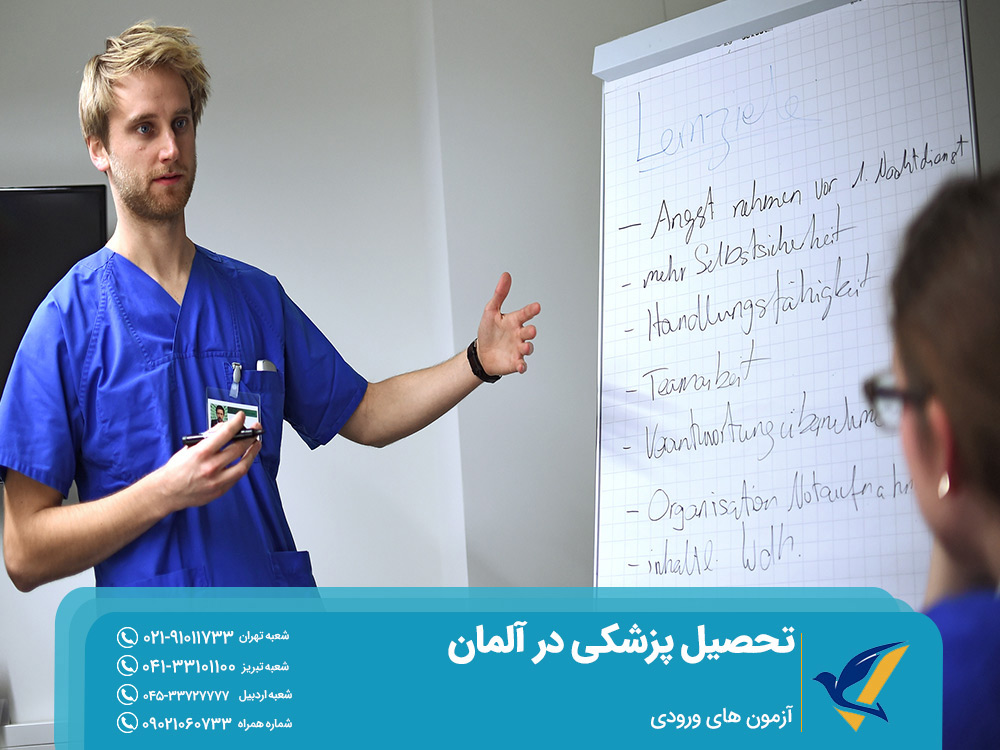Studying Medicine in Germany in 2025: Costs and Requirements
Thanks to the high academic reputation of its universities, studying medicine in Germany is an attractive and unique option for many international students. Germany is one of the leading and most technologically advanced countries in Europe and the world, particularly in medicine. The outstanding academic standards, strong job market, and affordable education costs make Germany an increasingly popular destination for medical studies and academic migration.
In this article from the Elme Vira Educational Migration Group, we will explore various aspects of studying medicine in Germany.
Advantages of Studying Abroad in Germany
When you think of Germany, innovation, technology, advanced medical facilities, and social security likely come to mind. After World War II, Germany rebuilt itself relentlessly and emerged as Europe’s top economic and technological powerhouse—and one of the most influential countries globally.
This development has also significantly boosted the academic reputation of German universities. Today, German universities are highly regarded around the world, attracting a large number of international students each year who come to study medicine and many other fields. In addition to the high academic standards, affordable tuition fees for medical programs and the availability of scholarships make Germany a top choice for international education.
Key benefits of studying in Germany include:
- High-quality education
- Affordable tuition fees for medical studies
- Internationally recognized university degrees
- Excellent job prospects for medical graduates in Germany
- A wide range of scholarships for outstanding students
Beyond these academic and financial advantages, Germany is also a culturally rich country. Its music, arts, natural attractions, and historical landmarks draw visitors from all over the world. International students benefit not only from excellent medical education and strong career prospects but also from the opportunity to broaden their global network and experience life in a diverse and vibrant environment.

Admission Requirements for Studying Medicine in Germany
The strong career prospects, high demand for medical professionals in Germany, and the global recognition of German universities and their degrees make studying medicine in Germany a logical and appealing choice. Some of these universities are even recognized by the Iranian Ministry of Health. To pursue medical studies in Germany, it’s essential to understand the full set of requirements, which we will now explore.
There are two main pathways to study medicine at German universities:
- Acceptance Through the Iranian Medical Entrance Exam
- In this case, applicants must pass the Iranian medical entrance exam (Konkoor) and obtain an official certificate of acceptance from the National Organization of Educational Testing. This certificate must then be submitted to the desired university in Germany. Alongside this certificate, students must hold at least a B2-level German language certificate. They are then required to complete a one-year Studienkolleg (preparatory course) in Germany before being eligible to begin medical school.
- Direct Application and Entrance Exam in Germany
- The other route is applying directly to German universities for admission and taking their entrance exams. This also requires a B2-level German language certificate and one year of Studienkolleg before entering medical school.
Another important criterion for studying medicine in Germany is age restriction. Generally, applicants must be under 30 years old, and their educational gap should not exceed 4 years.
Additional Admission Requirements for Medical Studies in Germany:
1. GPA Requirement
Public medical universities in Germany maintain high academic standards and are particularly strict about applicants’ academic performance and GPA. Typically, the required GPA for public universities is the equivalent of a grade of 20 out of 20 in the Iranian system. Admission with a lower GPA is extremely challenging at public universities.
However, applicants with lower GPAs can still apply to private universities, which also offer high-quality education and have a strong academic reputation. It’s important to note, though, that tuition fees at private universities are significantly higher than at public institutions.

2. Entrance Exams
Another key requirement for studying medicine in Germany is passing entrance exams and obtaining the required score set by the university or preparatory college (Studienkolleg). The most important entrance exams for medical studies in Germany are FSP (Feststellungsprüfung) and TestAS.
As mentioned earlier, prospective medical students must first complete a one-year Studienkolleg course. At the end of this program, they take the FSP exam, and passing it is mandatory for gaining admission to German medical universities. The TestAS exam, on the other hand, is a general aptitude test that evaluates students’ academic abilities and is required by some universities only.
Both of these exams are conducted in the German language. Additionally, for some medical programs, students are required to take the Medizinertest (also known as TMS – Test für Medizinische Studiengänge). This exam assesses the applicant’s ability to interpret and analyze data from charts and graphs, providing a measure of their suitability for studying medicine.
3. Required Documents for Studying Medicine in Germany
Like any other university worldwide, applicants for medical programs in Germany must submit their latest academic transcripts and diplomas with official translations, identification documents, and a valid passport scan. Additionally, proof of financial means (Finanzierungsnachweis) is essential to demonstrate the student’s ability to cover the cost of studying medicine in Germany.
Structure of the Medical Program in Germany
The duration of medical studies in Germany is six years, divided into three main stages:
- The first phase lasts 2 years,
- The second phase is 3 years,
- The final phase is a 1-year internship at the hospital.
Here’s a breakdown of the structure:
1. Pre-Clinical Stage
Duration: 2 years
In this stage, students learn the fundamentals of medicine, including basic sciences. At the end of this phase, students must pass a written and oral exam covering subjects such as biochemistry, anatomy, and physiology.
2. Clinical Science Stage
Duration: 3 years
This stage involves participation in laboratory sessions, lectures, internships, and seminars. Students develop both theoretical knowledge and practical skills. A final exam is conducted at the end of this phase to assess the student’s competence.
3. Final Clinical Year
Duration: 1 year
In the last year, students complete internships in hospitals and clinics, working under the supervision of their professors. This hands-on experience helps them apply their academic knowledge in real medical settings. The program concludes with a final written and oral examination, which students must pass to graduate.

Top Medical Universities in Germany
The high academic reputation of German universities both in Europe and internationally has led to a growing number of talented students choosing to migrate to Germany for medical studies each year. In addition, the affordability of studying medicine at public universities in Germany and the availability of scholarships are other key factors contributing to the increase in educational migration to the country.
Both public and private universities in Germany offer education at the highest quality levels, and all academic, educational, and welfare facilities meet top global standards. The top universities in Germany for studying medicine include:
- RWTH Aachen University
- University of Göttingen
- University of Munich (LMU Munich)
- Free University of Berlin
- University of Cologne – Faculty of Medicine
- University of Bonn – Faculty of Medicine
- Heidelberg University
- Ruhr University Bochum – Faculty of Medicine
- Hannover Medical School
- Charité – Universitätsmedizin Berlin
- Benjamin Franklin Campus – Charité Berlin
- Goethe University Frankfurt
- University of Freiburg (Albert Ludwig University of Freiburg)
- Friedrich-Alexander University Erlangen-Nürnberg
- Ludwig Maximilian University of Munich (LMU Munich)
Cost of Studying Medicine in Germany
As previously mentioned, the high academic standards, excellent job market, and affordable education costs make Germany an attractive destination for medical studies. The cost of studying medicine in Germany depends on the university. Most are aware that tuition fees at public universities in Germany are nearly free. Students only need to pay a registration and administrative fee at the time of enrollment.
Public universities do not charge tuition fees. The registration fee varies depending on the university and typically ranges between €250 and €600 per semester. However, there is one exception: universities in the state of Baden-Württemberg. International students who wish to study medicine (or other programs) in this state must pay an average tuition fee of €3,000 per year.
In contrast, private universities in Germany charge tuition fees averaging around €10,000 per year for medical programs.

Medical Scholarships in Germany
In addition to the high academic reputation of German universities, the availability of scholarships is another reason behind the growing demand for studying in Germany. However, it’s important to note that while many institutions and universities offer scholarships for various fields of study, scholarships specifically for medical studies in Germany are relatively limited.
Obtaining a medical scholarship in Germany can be more challenging. For example, Germany’s largest scholarship provider, the DAAD (German Academic Exchange Service), does not offer scholarships for medical students. To be eligible for scholarships from other institutions, students are typically required to have studied medicine in Germany for at least two years and must have successfully passed the first part of the state medical exam (Physikum).
Some available scholarships for international medical students in Germany include:
- Hamburg University Merit Scholarship
- Baden-Württemberg Foundation Scholarship
- Friedrich Ebert Foundation Scholarship
- SBW Berlin Scholarship
- German University Foundation – Medicus Program
It’s important to note that except for the SBW Berlin Scholarship, most of these scholarships do not cover the full cost of medical education in Germany. Instead, they offer partial financial support such as a monthly stipend or assistance with living or travel expenses. The SBW Berlin Scholarship, however, covers all tuition fees, monthly living expenses, travel costs, and accommodation in shared student housing.
Postgraduate Medical Specialization in Germany
There are two main paths for pursuing a medical specialty (residency) in Germany:
- For those who have completed their general medical education in Germany, they can directly apply for specialization programs.
- For those who obtained their general medical degree outside of Germany, the process includes:
- Having their medical qualifications officially recognized (equivalency process)
- Passing the Approbation exam (German medical licensing exam)
The required documents for applying to medical specialization programs in Germany include:
- Personal identification and a valid passport
- General medical degree certificate
- Medical council registration number (if applicable)
- German language proficiency certificate (minimum level B2 or C1)
- Proof of financial means to support the cost of living and education in Germany

Required Documents for Obtaining a Student Visa for Germany
Applicants wishing to study medicine in Germany who are from outside the European Union must obtain a student visa to study in Germany. The required documents for applying for a German student visa are:
- Official acceptance letter from a German university
- Valid passport with at least 6 months of validity and a copy of it
- High school diploma and transcripts with official translation
- Previous academic certificates with official translation (required for medical specialization studies)
- Completed application form for the German student visa
- Two passport-sized photos
Summary
Due to the high reputation of German universities and the country’s advanced infrastructure, studying medicine in Germany is an attractive option for many international students. Additionally, a favorable job market and the possibility of employment after graduation are other significant advantages of studying medicine in Germany.
Germany has many highly reputable public and private universities, each with its admission criteria. Tuition fees for medical studies at public universities in Germany are nearly free, with students only required to pay a registration and administrative fee ranging from 250 to 600 euros per semester. The only exception is the universities in the state of Baden-Württemberg, where international students must pay tuition fees.
Key conditions for studying medicine in Germany include a maximum age limit of 30 years, a maximum educational gap of 4 years, and minimum grade requirements.
Studying abroad is a complex and challenging process, and to succeed, it is essential to seek guidance from experienced consultants and specialists. Elm Vira Migration Group, with its excellent track record and skilled team, is one of the top migration consulting offices for studying abroad. They specialize in the latest immigration laws, university admission requirements, tuition costs, and more. For information on studying abroad and free consultation, visit the Elm Vira consultation section. Elm Vira consultants will contact you promptly.
Frequently Asked Questions
- How long is the medical study program in Germany?
- It lasts 6 years, including pre-clinical, clinical sciences, and clinical phases.
- How much does it cost to study medicine in Germany?
- Studying at most public universities in Germany is nearly free, with only registration fees required. Tuition fees vary in private universities.
- What are the most important conditions for admission to medical universities in Germany?
- Grade requirements and passing the entrance examination.
میانگین امتیازات 5 از 5
Vote count: 1 Vote